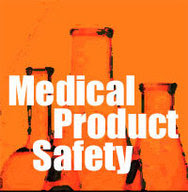
- ANNOUNCEMENTS
- OPPORTUNITIES FOR COMMENT / GUIDANCES
- PRODUCT APPROVALS & CLEARANCES
- PRODUCT SAFETY
- UPCOMING MEETINGS
- RESOURCES
ANNOUNCEMENTS
 The FDA takes step to remove artificial trans fats in processed foods
Based on a thorough review of the scientific evidence, the FDA finalized its determination that partially hydrogenated oils (PHOs), the primary dietary source of artificial trans fat in processed foods, are not “generally recognized as safe” or GRAS for use in human food. Food manufacturers will have three years to remove PHOs from products. More information
Are Healthcare Antiseptics Toxic to Staff and Patients?
FDA recently issued a proposed rule pertaining to the safety and effectiveness of over-the-counter (OTC) antiseptic products used in healthcare settings. Medscape spoke with Theresa Michele, MD, Director of the Division of Nonprescription Drug Products in the Center for Drug Evaluation and Research at the FDA, about the proposed rule and the implications for healthcare professionals and patients. More information
New Risk Evaluation and Mitigation Strategies website provides centralized, user-friendly source for approved REMS
FDA launched its new online resource REMS@FDA to provide the public with information about currently approved individual and shared system REMS as well as historical and released REMS.More information
FDA’s New Research Videos on E-Cigarettes, Nicotine and Cigarillos
How dramatic is the increase in e-cigarette use? Why are flavored little cigars and cigarillos increasingly popular among ethnic minorities? What would happen if we reduced the amount of nicotine in cigarettes so that they were no longer addictive?
These are just some of the questions that FDA-funded scientists are answering. Often research is focused on innovation and discovery to expand the body of scientific knowledge. Regulatory science is different—and exciting in its own way. How often do scientists get to see their research findings used to improve people’s lives? Tobacco regulatory scientists are doing just that. More information
|
 China’s Pharmaceutical Future – Both Complex and Growing
A visit to any one of the cities we visited on this trip – Shanghai, Nanjing and Beijing – would leave anyone marveling at the scale and trajectory of modern China. But it’s not just the sheer size of the population we were struck by. Rather, it was the seemingly tireless dedication to modernity that provided an almost palpable affirmation of what we already knew: that China — its skylines dotted with construction cranes and landscapes crisscrossed by high speed bullet trains — is inextricably connected with our own country’s economy, and increasingly with our agency’s ever-expanding regulatory mission.More information
|
 FDA Continues its Collaboration with Canada in Phase 2 of the U.S.-Canada Regulatory Cooperation Council
For more than 30 years, FDA has enjoyed a robust partnership with our Canadian regulatory colleagues. In FDA, we are excited to build upon this relationship in Phase 2 of the U.S.–Canada Regulatory Cooperation Council (RCC).
The RCC was established in 2011 by U.S. President Barack Obama and Canadian Prime Minister Stephen Harper to develop smarter and more efficient and effective approaches to regulatory cooperation between the two countries. More information
|
OPPORTUNITIES FOR COMMENT / GUIDANCES
 Comment Request; Medical Device Recall Authority
Section 518(e) of the FD&C Act provides FDA with the authority to issue an order requiring an appropriate person, including manufacturers, importers, distributors, and retailers of a device, if FDA finds that there is reasonable probability that the device intended for human use would cause serious adverse health consequences or death, to: (1) Immediately cease distribution of such device; (2) immediately notify health professionals and device-user facilities of the order; and (3) instruct such professionals and facilities to cease use of such device. More information
|
Draft Guidance for Industry: Developing Drugs for Treatment of Duchenne Muscular Dystrophy and Related Dystrophinopathies
The purpose of this draft guidance is to assist sponsors in the clinical development of drugs for the treatment of X-linked Duchenne muscular dystrophy (DMD) and related dystrophinopathies. More information
PRODUCT APPROVALS & CLEARANCES
 | FDA approves brain implant to help reduce Parkinson’s disease and essential tremor symptoms
FDA approved the Brio Neurostimulation System, an implantable deep brain stimulation device to help reduce the symptoms of Parkinson’s disease and essential tremor, a movement disorder that is one of the most common causes of tremors. More information
|

For more information on drug approvals or to view prescribing information and patient information, please visit Drugs at FDA orDailyMed
|
PRODUCT SAFETY

Need Safety Information?
For more important safety information on human drugs, medical devices, dietary supplements and more, or to report a problem with a medical product, please visit MedWatch. To receive MedWatch Safety Alerts by emailsubscribe here.
|
 May 2015 Safety Labeling Changes
Pharmacists in the Office of Health and Constituent Affairs reviewed May 2015 labeling changes to inform you of 43 products with safety revisions to prescribing information. More information
HeartWare Ventricular Assist System: Class I Recall - Damaged Alignment Guides or Connection Pins May Cause Pump to Stop
The alignment guides in the power supply connector ports may wear down over time. This can cause the connection pins to become twisted or bent, and eventually prevent the patient from connecting the device controller to their VAS. An interruption in this electrical connection would cause the pump to stop, which could cause serious patient injury or death. More information
Potiga (ezogabine): Drug Safety Communication - FDA Determines 2013 Labeling Adequate to Manage Risks of Retinal Abnormalities, Potential Vision Loss, and Skin Discoloration
Based on reviews of additional safety reports from patients treated with the anti-seizure drug Potiga (ezogabine), the FDA has determined that the potential risks of vision loss due to pigment changes in the retina and of skin discoloration can be adequately managed by following the current recommendations in the Potiga labeling. To further explore any potential long-term consequences of these pigment changes, FDA has required the Potiga manufacturer, GlaxoSmithKline, to conduct a long-term observational study. More information
Injectable Products by Mylan: Recall - Presence of Particulate Matter
Mylan expanded its voluntary nationwide recall to the hospital/user level of select lots of Gemcitabine for Injection and Methotrexate Injection products due to the presence of visible foreign particulate matter observed during testing of retention samples. More information
|
Vascu-Guard Peripheral Vascular Patch by Baxter: Recall - Difficulty Distinguishing the Smooth from Rough Surface
Baxter announced it is voluntarily recalling four product codes of its Vascu-Guard Peripheral Vascular Patch. Baxter received customer complaints of difficulty in distinguishing the smooth from rough surface of the Vascu-Guard patch as described in the labeled instructions for use. More information
UPCOMING MEETINGS
FDA advisory committee meetings are free and open to the public. No prior registration is required to attend. Interested persons may present data, information, or views, orally at the meeting, or in writing, on issues pending before the committee.
Other types of meetings listed may require prior registration and fees. Click on "more information" for details about each meeting.
Please visit FDA’s Advisory Committee webpage for more information. Please visit Meetings, Conferences, & Workshops for more information on other agency meetings.
Pharmacy Compounding Advisory Committee (Jun 17-18)
On June 17, 2015, during the morning session, the committee will receive updates on certain issues to follow up on discussions from the last meeting including the options for obtaining access to investigational new drugs and the processes FDA plans to use to add or remove drugs from the section 503A bulk drug substances list. During the afternoon session, the committee will discuss four bulk drug substances nominated for inclusion on the section 503A bulk drug substances list. During the morning session on June 18, 2015, the committee will discuss the criteria FDA is proposing to use to evaluate drug products or categories of drug products for identification as demonstrably difficult to compound. More information
Public Meeting: Exploring Naloxone Uptake and Use (July 1-2)
FDA in collaboration with the National Institutes of Drug Abuse, the Centers for Disease Control and Prevention, the Substance Abuse and Mental Health Services Administration, and the Health Resources and Services Administration, is announcing a scientific workshop to initiate a public discussion about issues surrounding the uptake of naloxone in certain medical settings – such as on ambulances and in association with prescriptions for opioids – as well as outside of conventional medical settings to reduce the incidence of opioid overdose fatalities. Academia, government, industry experts, and patient advocates will discuss which populations are at risk for opioid overdose and how public health groups can work together to use naloxone to reduce the risk of overdose. We will also explore legal, regulatory, logistical and clinical aspects related to making naloxone more widely available. More information
Joint Meeting of the Drug Safety and Risk Management Advisory Committee and the Anesthetic and Analgesic Drug Products Advisory Committee (Jul 7-8)
The committees will discuss the results of post marketing studies evaluating the misuse and/or abuse of reformulated Oxycontin (oxycodone hydrochloride) extended-release tablets, supplemental new drug application (sNDA) 022272, manufactured by Purdue Pharma L.P. The committees will discuss whether these studies have demonstrated that the reformulated Oxycontin product has had a meaningful impact on abuse of Oxycontin. More information
Oncologic Drugs Advisory Committee (Jul 9)
The committee will discuss biologics license application 125547, necitumumab injection, application submitted by Eli Lilly and Company. The proposed indication (use) for this product is in combination with gemcitabine and cisplatin for first-line treatment of patients with locally advanced or metastatic squamous non-small cell lung cancer. More information
Public Meeting: Medical Device User Fee Reauthorization (Jul 13)
FDA will hold a public meeting to gather initial input on reauthorization of the Medical Device User Fee program, as required by section 738A of the Federal Food, Drug, and Cosmetic Act. Additional information and Federal Register announcement available. More information
Public Meeting: Prescription Drug User Fee Reauthorization (Jul 15)
The Federal Food, Drug, and Cosmetic Act (FD&C Act) requires that FDA hold public meetings and conduct discussions with both the regulated industry and stakeholder groups in developing recommendations for the next PDUFA program (FY2018-2022). More information
Public Workshop: Robotically-Assisted Surgical Devices - Challenges and Opportunities (Jul 27-28)
The purpose of this workshop is to obtain public feedback on scientific, clinical and regulatory considerations associated with RAS devices. Comments and suggestions generated through this workshop will facilitate further development of regulatory science for RAS technologies. The participants of this workshop will discuss current challenges and opportunities related to RAS devices and address clinical, technical and training questions related to the safe and effective use of these devices. More information
RESOURCES

For more important safety information on human drug and devices or to report a problem to FDA, please visit MedWatch
|
Comunicaciones de la FDA sobre la seguridad de los medicamentos en español
Descargo de responsabilidad: La FDA reconoce la necesidad de proporcionar información sobre seguridad importante en idiomas distintos al inglés. Hacemos lo mejor posible para proporcionar versiones en español precisas y oportunas de nuestras Comunicaciones de Seguridad de Medicamentos. Sin embargo, en caso que existiera discrepancias entre las versiones en ingles y en español, la información contenida en la versión en inglés es la que se considera como versión oficial. Si tiene alguna pregunta, por favor contáctese con Division of Drug Information endruginfo@fda.hhs.gov. Comunicaciones de la FDA
 MedWatchLearn - Practice Reporting to FDA!
This web-based learning tool teaches students, health professionals, and consumers how to complete the forms necessary to report problems to FDA.More information
|
FDA Expert Commentary and Interview Series on Medscape
As part of the continuing collaboration between FDA and Medscape, a series of interviews and commentaries are available to communicate important safety information to clinicians. Featuring FDA experts, these original commentaries cover a wide range of topics related to FDA's multi-faceted mission of protecting and promoting the public health by ensuring the safety and quality of medical products such as drugs, foods, and medical devices More information
 | Cardiovascular and Endocrine Liaison Program
The Cardiovascular and Endocrine Liaison Program serves as a liaison between the FDA and the cardiovascular and endocrine health professional and patient communities. Discover how you or your organization can collaborate with FDA. More information
|
FDA Basics
Each month, different Centers and Offices at FDA will host an online session where the public can ask questions to senior FDA officials about a specific topic or just listen in to learn more about FDA. More information
FDA Voice
FDA voice is the official blog from FDA's senior leadership and staff.More information
|  |
Medical Product Safety Network (Medsun)
Medsun improves FDA's understanding of problems with the use of medical devices so that the FDA, healthcare facilities, clinicians, and manufacturers can better address safety concerns. The Medsun newsletter provides monthly updates about timely medical device issues that may impact patient safety. More information


































No hay comentarios:
Publicar un comentario